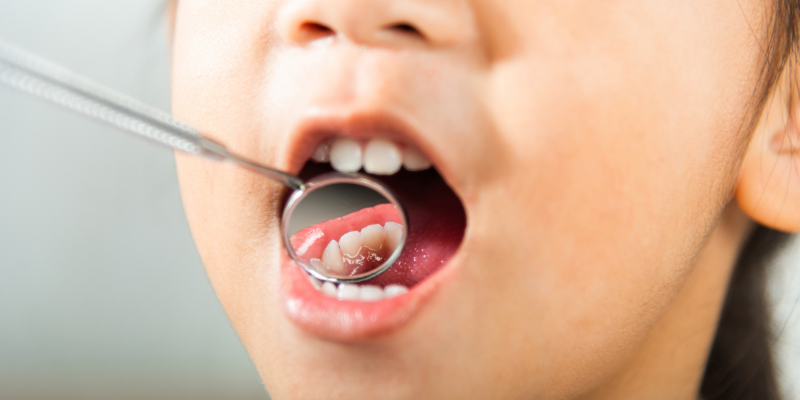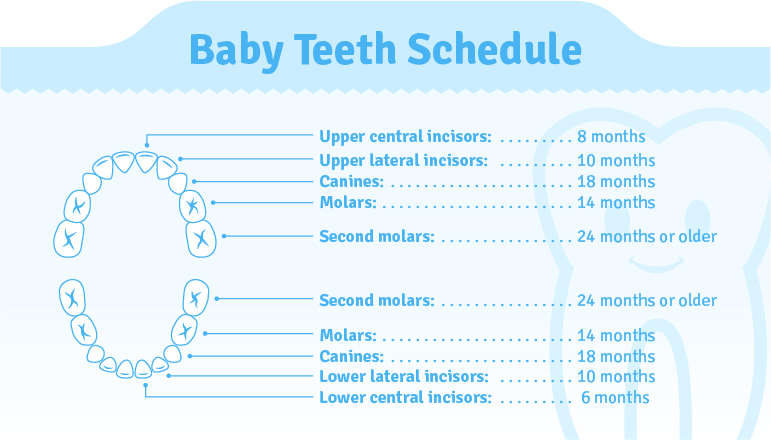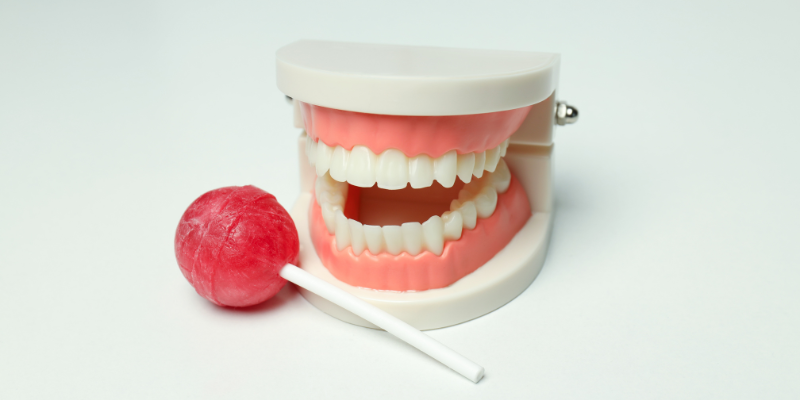
Practicing proper dental care from infancy through adolescence is vital for developing adult teeth that are healthy and strong. In this blog on dental care for children, we’ll look at the following:
- When should a child start brushing their teeth?
- When should a child start going to the dentist?
- How often should a child go to the dentist?
- Daily routines for children brushing their teeth
- Ways to avoid cavities for young children
When Should A Child Start Brushing Their Teeth?
Once your baby has teeth, it’s time to introduce the toothbrush. The first tooth is typically developed in children aged six months. While baby teeth eventually fall out around the age of six, it’s essential to clean and care for them just as you would adult teeth to ensure that your child is developing good oral health for kids and laying the ground for healthy adult teeth.

The toothbrush you choose for your child should have a handle that’s large enough to maneuver comfortably but a head small enough to fit comfortably in your baby’s mouth. Initially, it’s not necessary to use toothpaste when caring for baby teeth; simply wet the brush with water and clean the teeth after feedings.
Once your child is old enough to spit after brushing (typically around one to three years old), you can add a pea-sized amount of non-fluoride toothpaste for teeth cleanings. Brush the front and the back teeth at least twice a day. As the child ages, you can move to fluoride toothpaste, but make sure your child can rinse and spit out.
When Should A Child Start Going To The Dentist?
Many people mistakenly think that children don’t need to visit the dentist until all of their teeth have come in. Most dentists recommend the first trip take place at age one. That’s because it’s important to set a baseline for children’s dental health. The dentist should get an early look at your child’s mouth to see how it is developing and advise on the proper oral hygiene for kids.
The dentist can also guide you in caring for your teething baby and determine if additional fluoride is necessary to prevent childhood tooth decay. Additionally, if thumb sucking is a concern, your child’s dentist can offer advice on breaking this habit and explain its potential effects on their developing teeth.
How Often Should A Child Go To The Dentist?
It’s recommended that children go to dental checkups every six months. This allows for regular checkups, including a dental exam, cleaning, fluoride treatment, and X-rays.
Daily Routines For Children Brushing Their Teeth
As your child ages, they will take over more and more dental-care activities themselves. It’s crucial to balance teaching your child a dental routine while remaining involved in their oral health.
A 2020 dental hygiene study from Delta Dental Insurance found that of the parents interviewed,
- 52% believe brushing their child’s teeth takes time away from things their child would rather be doing
- 44% think their child simply finds it boring
Instructing your child on how to brush their teeth properly is imperative.
- Ensure that your child is brushing at least twice a day, for two minutes per session, the amount recommended by dentists.
- Have your child hold the brush at a 45-degree angle, brushing gently from gum to tooth.
- Emphasize being gentle while brushing. If your child saws away aggressively at the mouth, it could cause problems such as receding gum lines or tooth sensitivity in later years.
- Ensure the child covers every tooth surface (back, top, side, and front).
- Remind your child to brush the top of the mouth and the tongue, moving the brush forward toward the front of the mouth. This gets rid of lingering bacteria in the oral cavity.
Find a favorite song that lasts two minutes to help your child get a feel for how long they should be brushing. You can play the music every morning and night during tooth brushing so your child becomes familiar with how long their brushing sessions should take.
Ways To Avoid Cavities For Young Children

Brush, Floss, and Dental Visits
Establish daily brushing and flossing habits early, as well as getting the child familiar and comfortable with the dentist.
- Wipe your child’s growing teeth twice daily, and don’t forget about flossing. As teeth grow right next to each other, it’s important to floss to keep the spaces in between clean.
- Make going to the dentist fun. If you don’t treat it as a chore, your child will enjoy it and be more comfortable in the chair as time goes on.
- Brush your child’s teeth after they take medicine, such as liquid acetaminophen, for teething pain. This is because there’s sugar in medication that can lead to tooth decay.
- Don’t put your baby to bed with a bottle after their teeth come in. This can also lead to tooth decay.
Encourage a Healthful Diet
The number one cause of cavities in children is poor diet. Even though baby teeth eventually fall out, children can still damage their teeth by eating foods with lots of sugar and citric acid. There are several tips you can keep in mind to prevent cavities and protect your child’s teeth.
- Crunchy fruits and vegetables help to clean the teeth by scraping away built-up plaque.
- Foods high in water content and protein sources rich in calcium and phosphorus help teeth re-mineralize are the best choices.
- Limit candy, pastries, and dried fruit consumption as much as possible. Your child should also brush their teeth and gums after they eat these foods.
- The American Academy of Pediatric Dentistry advises that children drink only water between meals. This helps cleanse the mouth of unhealthy bacteria, and it’s good for overall health, too, keeping your child hydrated.
- Stay away from soda, juice, and high-sugar foods. Not only are they empty calories for kids, but a lot of sugary foods and drinks can harbor citric acid that leads to tooth decay.

Published on: August 22, 2014
Updated on: November 2, 2023
